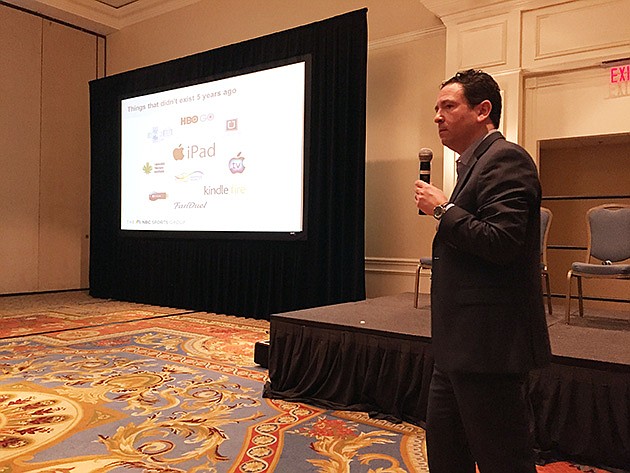- July 26, 2024
-
-
Loading

Loading

The blending of professional sports and intricate data is a decade-old philosophy that has delivered wins everywhere from Tampa to Toronto.
But data analytics have moved beyond sports and into business side of games. For the Tampa Bay Rays or Lightning, that might mean filling seats at Tropicana Field or Amalie Arena. For businesses outside of sports, the use of data can also be a tool to grow market share.
“When people see analytics, they think it's all these equations and math,” says Michael Mondello, an associate professor and associate program director of the University of South Florida's sport and entertainment management program. “In reality, it's all about ideas, it's all about thinking. It's about how you approach problems, using data as a way to make informed decisions.”
Mondello hosted a two-day conference at the Tampa Marriott Waterside in early April to highlight the world of analytics in sports and entertainment. Around 115 attendees heard speakers from various sports teams and television networks.
Sports by its very nature is numbers-driven, so marrying statistical analytics with teams makes sense. That's something Chris Kamke focuses on a lot as director of business strategy and analytics with the Tampa Bay Lightning.
“We're a non-traditional hockey market, so probably 70% of our time is spent on ticket sales and ticket services,” Kamke says. “People are purchasing tickets through Ticketmaster, or through our ticket office, and there is a lot of useful data those people give when buying.”
Teams like the Lightning buy additional information through third-party aggregators to help expand its demographic profile of potential buyers. That helps determine whether they might be a good focus for future tickets, or maybe even a season ticket package.
“You can easily tie transactions to a person, and learn the best ways to attract them in the future,” Kamke says. “There are definitely costs involved. But, as everyone knows, it's easier to retain an existing customer than attract a new one.”
Another example of using analytics to boost business happened soon after hedge fund manager Jeff Vinik bought the Lightning in 2010. The team gave each season ticket holder a personalized jersey, armed with a radio-frequency microchip embedded in the sleeve.
That chip gave the wearer of the shirt a discount at the concession stand. It also provided the team valuable data about the spending habits of its customers.
In general, with technology advances, collecting data is easier than ever before. But companies — not just sports teams -- have to know how to use it too, Mondello says.
“You can have lots of information, but it's useless if you never do anything with it,” he says. “That's how you separate the winners and the losers.”
Follow Michael Hinman on Twitter @BizTampaBay